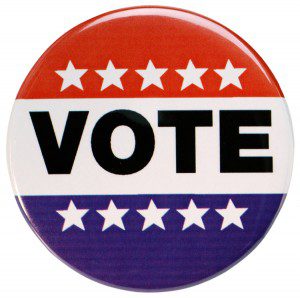Throughout much of the U.S. it’s an election day. It’s not a big sexy presidential election day, more of a nuts-and-bolts, boring-business-of-civilization election day. But those matter, too, a lot.
As John Oliver pointed out Sunday, voters in several states will determine the future of medicaid expansion today. This is not abstract or theoretical for more than three million low-income Americans. The people who bother to show up at the polls in their states today will determine whether or not those three million people are able to have access to health care.
When Oliver says “American lives are at stake here,” it’s no exaggeration:
And there are plenty of other important things at stake today. Here in Pennsylvania, we’re electing the justices who serve on our state supreme court. This is a horrible system, electing the judiciary. It’s why my state regularly suffers through embarrassments like having state supreme court justices forced to resign over their porn-filled and racist emails. Or having to convict those rat-bastards elected to lower courts up in coal country — the judges who were taking kickbacks from private prison operators and basically selling children into the prison system for money.
The Pennsylvania Bar Association’s evaluation of this year’s supreme court candidates is here.
Election day here in my town means picking a county council, county DA, county sheriff, and five seats on the Downingtown Area School District board. Those all matter.
 The sheriff’s election and the vote for other county posts like prothonotary, registrar of wills and recorder of deeds are the product of old reforms meant to curb corrupt patronage. To prevent local bosses from appointing cronies to county jobs (or selling those jobs to the highest bidder), those posts all became elected offices. So now instead of going to the corrupt boss’s brother-in-law, those jobs usually go to the candidates with the least-ethnic sounding names that appear closest to the top of the county ballot.
The sheriff’s election and the vote for other county posts like prothonotary, registrar of wills and recorder of deeds are the product of old reforms meant to curb corrupt patronage. To prevent local bosses from appointing cronies to county jobs (or selling those jobs to the highest bidder), those posts all became elected offices. So now instead of going to the corrupt boss’s brother-in-law, those jobs usually go to the candidates with the least-ethnic sounding names that appear closest to the top of the county ballot.
When those patronage reforms were first instituted, the idea was that local voters would be well-equipped to know local candidates. These days, it’s almost impossible to learn anything about such candidates or such elections, unless its from the candidates themselves. The collapse of the local press has thus, in effect, turned control of these local posts back to the corrupt moneymen of the old patronage system.
When I first worked for a newspaper, I was proud of the dynamite work we did informing readers about every candidate in every local race. We profiled and interviewed all of them. After the second round of layoffs, the paper stopped doing that. After the third round of layoffs, we didn’t even publish the results of every election. And after the fourth round of layoffs … well, I don’t know. My job was eliminated in the fourth round and I could no longer afford a subscription to a newspaper that I knew from experience no longer fact-checked or copy-edited much of what it published.
Still, though, the same Internet that contributed to the demise of your local paper offers some resources for informing yourself about local elections. Use it and learn what you can, because it may seem like there’s less at stake today than in those big, sexy national elections, but you also have much more of a say in what gets decided today. Local elections in an off-year are low-turnout affairs. Just by showing up to vote, you’ll have a bigger impact than you do in those big elections every four years.
As @absurdistwords said the other day on Twitter: “You know one of the easiest ways to wield political power? Show up to ANYTHING local.”
Do that. Show up.












